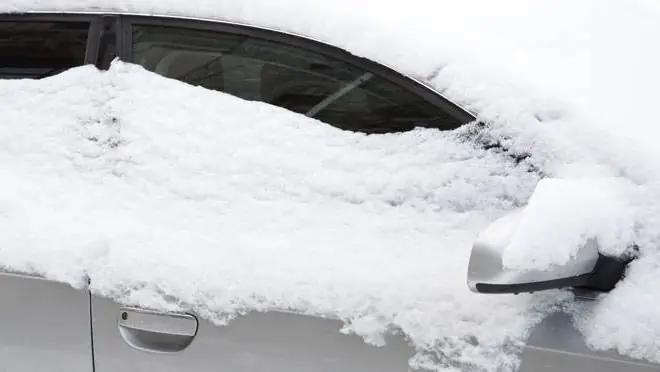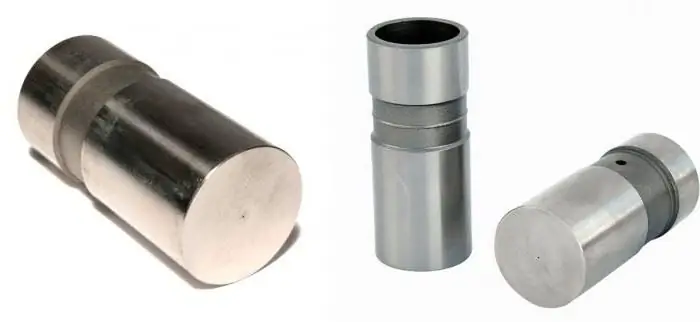2026 Author: Erin Ralphs | ralphs@carsalmanac.com. Last modified: 2025-01-22 21:14:16
Experienced car owners who carefully monitor the condition of their car, constantly listen to various noises that sometimes occur during the operation of the car. Hearing the noise, they immediately try to find the cause and eliminate it. Many knock hydraulic lifters on the cold. Let's try to figure it out and find out how to eliminate such a knock.
How the hydraulic compensator works
The design is a body and a movable plunger pair, which consists of a sleeve, a spring, and a valve with a ball. There are several versions of these nodes. Hydraulic lifters knock on cold also, regardless of type.

At the moment when the camshaft cams become their non-working side to the pusher, a gap is formed between the plunger and the shaft. So that the lubricant can enter the plunger, it is equipped with a special valve. Thanks to the spring, it can rise, thereby compensating for the gap. Along with this, oil enters the compensator housing. When the camshaft turns and presses on the tappet, the ball valve closes. Oil is squeezed into the gap of the plunger and bushing. This further changes the volume. This is how the compensator performs its functions.
The hydraulic lifters are knocking: we are establishing the reasons
So. Motorists with extensive experience claim that nothing will knock on a fully serviceable car. And if extraneous noises appear, then something is wrong. Why can these knots knock?
Among the main reasons are mechanical wear or wear that forms on the surface of the plunger pair. Also, extraneous sounds may occur due to unstable operation of the valve responsible for supplying oil.

Possible banal contamination of the compensator. Often, motorists are faced with the fact that the wrong oil or low-quality oil is poured into the car. In addition to all this, it is noted that the hydraulic lifters knock on the cold due to the air that appeared in the lubrication system. So, air bubbles affect the compressibility of the oil. It is also worth checking the oil filter, it may be clogged.

It is possible that the lubrication channels are clogged.
The expansion joints do not knock all at once. Sounds can occur due to wear or failure of even just one part.
It's all about the oil…
If the hydraulic lifters knock on the cold, then it makes sense to sin on the oil.

And to be more precise, it is for viscosity. If the lubricant in the engine has not been changed for a long time, now is the time to change it. If you decide to diagnose your car, then be sure to consider the most optimal oil temperature. Maybe it's the temperature.
Compensator valve
It happens that this very valve does not hold oil. Then, when the motor is cold, it may leak due to loose connections. This is how air enters the system. When warmed up, it disappears ten minutes after starting.
To diagnose this, you need to start the engine. Let the engine run for at least three minutes. Turnovers must be kept at 2500. Then slow down to the idle level, and then add speed again. This is enough for the air to completely escape, and the compensator stops knocking. But at every start, the hydraulic lifters knock on the cold again and again.
Inlet port
It happens that this hole can become clogged, and in fact it is designed to receive lubricant. How does the compensator work further as the engine warms up? The lubricating fluid heats up, then the gap expands. The debris that blocked the holes disappears, and the oil begins to flow in an amount close to normal. However, various viscous particles, when cooled, will clog the hole again, which will lead to poor lubricant access. That's why hydraulic lifters knock when cold.
To fix the problem, you can try changing the oil.

The required lubricating fluid must have a lower viscosity. It is recommended to flush the engine before replacement. Also, motorists will be saved by installing a new node.
Oil filter
If it is clogged, then this is one of the reasons why the hydraulic lifters knock on the cold. Extraneous sounds stop as the engine warms up. Then some of the lubricant passes through the filter. However, in most cases, miracles do not happen. The driver will hear a knock even when the engine is warm.
To get rid of this problem, you just need to replace the filter.

You can also change the grease itself if enough time has passed since the last change.
More experienced motorists constantly keep a "flight log", where they write the mileage when changing the oil, as well as the time of the operation. It helps a lot to complete it on time.
Why do hydraulic lifters knock on cold: "Priora"
This is a common problem on these models, as well as on many others from AvtoVAZ. Let's try to figure out where the knock comes from and how to deal with the problem.
Here are some typical reasons for the appearance of knocks. So, if it knocks during a snack, and then the noise disappears, then this cannot be considered a problem. If extraneous sounds appear both on a cold and on a sufficiently warm unit at the time of an increase in speed, then most likely it will be necessary to replace the unit. Contamination is possible - here you can get by with a banal cleaning.
Hydraulic lifters and"Accent"
Knocking reasons are standard here. The owners write that the problem can be solved by changing the oil. More experienced owners believe that if the hydraulic lifters knock on the cold ("Accent" is no exception) - this is nothing more than a feature of the engines.
But in general, most drivers change oil with a viscosity of up to 5W30, and this allows you to completely get rid of the knock of these mechanisms in the engine.

Oil pump should be checked. Maybe it's not putting out enough pressure. Also, many recommend lubricants from the manufacturer "Valvoline".
How to check hydraulic lifters with your own hands
You can check the condition of the spring.

You can also measure the size of the gaps between the valve guide and the valve stem. If the gap is large, it must be eliminated.
Then, turn the crankshaft so that the knocking valve begins to open. After that, you can turn the spring. The valve will rotate with it. After starting the engine, the knock should completely disappear. If the hydraulic lifters are still knocking on the cold, Priora needs to repeat the above operations. And it is best to replace the damaged node with a new one.
How to find out which of the hydraulic lifters is out of order
Acoustic diagnosis is usually sufficient. If this method does not help, then press the knot with a screwdriver. A normally operating structure will squeeze throughenough force applied. If it compresses easily, then it is defective and should be replaced as soon as possible.
In the second method, the camshaft mechanism cams should be installed in turn with its protrusions up. Here you need to make sure that there is a certain gap between the cam and the pusher. While pressing the compensator down, try to compare it with known good parts. If there is a gap or the lowering speed is high, then you need to clean or replace the element.
How to eliminate knocking
Of course, the best is a replacement. You can also try to repair. However, there are other ways. So, you can try to flush these knots. It is worth saying that this process requires certain skills and a resource of time.

But this event does not guarantee that the sounds will be eliminated. For many, the knock of hydraulics on the cold was eliminated only after replacing them with new ones. Even the new oil didn't help.
Consequences of knocking
If you hear these sounds regularly, don't expect anything. Please contact the service immediately. On some cars, knocking is considered normal. This applies to domestic-made cars during warm-up (further, the noise of the parts disappears). But in most cases, this significantly reduces the resource of the gas distribution mechanism drive. You need to drive carefully.
Knocking after replacement
Usually new parts do not knock.

If you still hear sounds, thenIs it a manufacturing defect or a problem with the valves. In order to perform an accurate diagnosis and make sure that the valves have nothing to do with it, it is necessary to check their fastenings. There is a possibility that the parts did not give the desired shrinkage. We just twist them and thereby remove the knock of the hydraulic lifter.
In the end…
From all this it is clear that knocking on the cold can be for a variety of reasons. If the compensators are noisy and this does not stop, then you need a replacement. But you can use modern additives, which, according to manufacturers, reduce noise levels. You can also count on an oil change to help. Now you know why hydraulic lifters are knocking - you can easily find and eliminate the cause yourself.
Recommended:
Flushing hydraulic lifters: procedure. Knock of hydraulic lifters on cold

Do-it-yourself car repair in most cases allows not only to save a lot, but also to prevent serious malfunctions in a timely manner. In vehicles equipped with 16-valve cylinder heads, hydraulic lifters may knock. It is possible to correct the situation. Flushing hydraulic lifters will help. Let's see how it's done
Poor start on a cold diesel. Cold car hard to start

Modern cars are equipped with various options that should make it easier to start a cold engine, but often these devices do not cope with their tasks, and the engine starts poorly on a cold one, or even does not start at all. At the same time, a warm engine can work very easily and well
Starting the engine in the cold. Starting an injection engine in cold weather

The article describes how to start the engine in cold weather. Considered injection and carburetor engines with specific examples and recommendations
Hydraulic compensator - what is it? Knock of hydraulic lifters: causes, repair

Modern cars are equipped with a device such as a hydraulic compensator. What is this node? How does he work? All this and more - further in our article
The hydraulic compensator knocks on the cold. Knock of hydraulic lifters on a cold engine

Every motorist, when operating a vehicle, will certainly listen to how his car works. The appearance of extraneous noise in the operation of the engine, as a rule, does not bring joy to the owner. The presence of the slightest malfunction requires urgent diagnostics and troubleshooting

